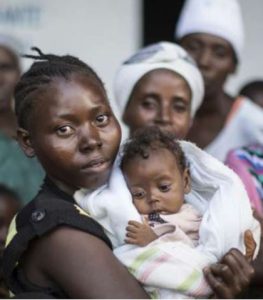Report exposes gender-based violence among refugees
As many as 70 per cent of women and children forced from their countries as refugees experience sexual and gender-based violence (SGBV), according to new international research.
The study, involving the University of Melbourne, found many of the women and children experiencing SGBV suffer repeated violence at the hands of different perpetrators, with the harm often occurring before displacement, through conflict and transit to the time they found refuge in a new country.
 Titled ‘Nobody helped me: Forced migration and sexual and gender-based violence’, the report said that by 2020, there were more than 82 million people displaced from their homes.
Titled ‘Nobody helped me: Forced migration and sexual and gender-based violence’, the report said that by 2020, there were more than 82 million people displaced from their homes.
Co-author and University of Melbourne Senior Research Fellow, Dr Karen Block said that have of this number were women and girls.
“They are women and girls who are at risk of physical harm including broken bones, burns and scarring, forced pregnancy and rape as well as psychological trauma and thoughts of suicide and self-harm,” Dr Block said.
Launched in Geneva with the International Red Cross, the report is a collaboration between the University of Melbourne, the University of Birmingham, Bilkent University in Turkey and Uppsala University in Sweden.
It is based on interviews carried out between 2018 and 2021 in the UK, Turkey, Tunisia, Sweden and Australia with more than 300 survivors and practitioners.
In Australia, the UK and Sweden, it was found further violence and harm can occur even when women seeking asylum reach a settlement country.
This includes exacerbation of existing psychological trauma and exposure to intimate partner violence that may be continuing, or even start, after forced migration.
Immigration detention, insecure visa status, barriers to accessing services, poverty, lack of housing, stigma and racism are also factors which increase risks.
Researchers said the report, which also found some asylum seekers also reported feeling unsafe across journeys and in asylum accommodation because of their sexual orientation and gender identity or expression, has particular urgency given the situation in Ukraine.
“With more than four million people, mainly women and children, fleeing Ukraine as a result of the Russian invasion, forced migration is an issue that is confronting us today,” Dr Block said.
University of Melbourne Associate Professor Cathy Vaughan, who led the Australian arm of the study, said the findings are a wake-up call for everyone.
“This report provides multi-country evidence to humanitarian aid organisations, governments, border, immigration and asylum agencies that sexual and gender-based violence against refugees is a global, cross-border challenge that demands urgent attention and new ways of working transnationally to support people when they need it most,” Associate Professor Vaughan said.
The report calls for humanitarian and aid organisations to develop programs to address SGBV along forced migration routes, as well as to develop systems to capture data about the complex experiences of SGBV at each stage of the journey.
It calls on institutional funders to fund mobile service delivery of essential services for forced migrants on the move – for example, post-rape contraception.
Also among its recommendations is the provision of legal routes to remove the need for hazardous journeys.
It says border, immigration and asylum agencies should develop gender-sensitive reception and asylum procedures and ensure access to safe and secure housing for SGBV survivors.
Read more here: Refugee report shows women and children face threat of sexual and gender-based violence on migration journey (unimelb.edu.au)












